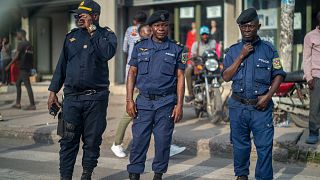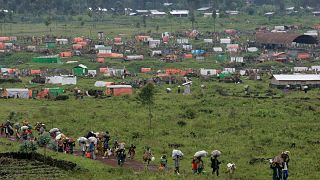Democratic Republic Of Congo
The World Health Organisation (WHO)confirmed on Friday that a doctor has become the first probable Ebola case in one of the eastern Democratic Republic of Congo’s most violence-ridden and inaccessible zones.
WHO described it as a scenario “we have all been dreading”.
Since the outbreak erupted on Aug. 1, 103 confirmed and probable cases of Ebola have been identified in North Kivu and Ituri provinces, including 63 deaths, Congo’s health ministry said in an overnight update.
Why Ebola in Oicha is a nightmare
A doctor living in the town of Oicha in North Kivu has been re-hospitalised with Ebola symptoms after his wife was confirmed as having the disease when she travelled to the nearby city of Beni, said Dr. Peter Salama, WHO’s head of emergency operations.
Oicha is almost entirely surrounded by ADF Ugandan Islamist militia, and there are “extremely serious security concerns” following many civilian killings, he said. Aid workers, priests and government officials are held hostage in the area, he added.
ALSO READ: DR Congo militia threat setback to Ebola fight, death toll hits 44More than 100 armed groups operate in all of volatile eastern Congo, including dozens in North Kivu.
Vaccinations and damage control
The doctor’s initial test for Ebola – which causes vomiting, haemorrhagic fever and diarrhoea – had been negative but fresh results are awaited after retesting, Salama told Reuters. The doctor is among 14 confirmed or probable cases among health workers.
So far 97 of the couple’s contacts who may have been exposed to the virus have been identified, and vaccination has begun in Oicha, according to Salama.
“So for the first time really we have a confirmed case and contacts in an area of very high insecurity. It really was the problem we were anticipating and the problem at same time that we were dreading,” he told a news briefing.
WHO and health experts reached Oicha with armed escort by MONUSCO troops this week from Beni along a road classified as a “red zone” in terms of insecurity, Salama said.
“We know from that incident now in Oicha we are going to have to operate in some very complex environments due to security and access concerns.”
More than 2,900 people have been vaccinated against Ebola since the outbreak began and another 10,000 doses are currently available, Salama said.
REUTERS













01:01
Trial of DRC's former Justice Minister Constant Mutamba postponed for two weeks
Go to video
South Sudan's president Salva Kiir dismisses army chief Paul Nang Majok
01:09
Liberian president issues official apology to civil war victims
00:55
The Democratic Republic of Congo celebrates the centenary of Patrice Lumumba's birth
01:04
South Africa reports new bird flu outbreak on poultry farms
01:12
One child displaced every five seconds in MENA region conflicts